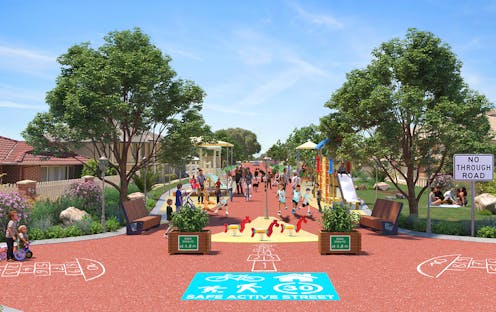Cars have taken over our neighbourhoods. Kid-friendly superblocks are a way for residents to reclaim their streets
- Written by Matthew Mclaughlin, Research Fellow, Telethon Kids Institute, The University of Western Australia

You might remember[1] your time as a child playing outdoors with friends and walking to school. These activities had tremendous benefits for our health and development[2].
Today, parents[3] report barriers[4] to letting their kids play, walk and ride in their neighbourhood. The safety of local streets[5] is a major concern.
Read more: Japan's Old Enough and Australia's Bluey remind us our kids are no longer ‘free range’ – but we can remake our neighbourhoods[6]
One way to boost communities is to create “superblocks for kids”. Pioneered in cities like Barcelona[7], a superblock covers several neighbourhood blocks reserved for shared use by cyclists, walkers and residents who simply want to use the street space. Superblocks allow low-speed access for residents’ cars, but exclude through-traffic.
Superblocks have evolved from concepts dating back to the 1970s[8]. Retrofitted[9] and planned[10] examples of more liveable and safer streets can be found from Melbourne[11] to Perth[12], where there are interesting alternative designs in Willetton[13] and Crestwood[14].
Transforming neighbourhoods in this way enables us to once again enjoy the public space right on our doorsteps – the street.

















